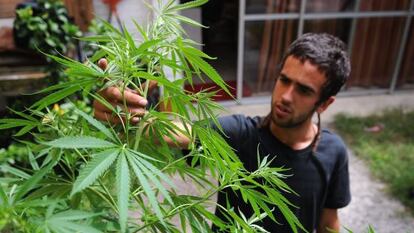Uruguay delays implementation of legal framework for marijuana sale
Home-growth is on the rise in anticipation of new distribution methods being put in place

In December 2013, Uruguay became the first country in the world to legalize the production and sale of marijuana. But this pioneering decision is presenting a number of challenges when it comes to implementation. The new law states that cannabis can be grown at home, acquired with a prescription at a pharmacy for registered users, or bought through cannabis clubs. While marijuana production is on the rise, the government has yet to put any of these legal frameworks in place. Meanwhile, home-growing is on the rise in anticipation of the final measures being introduced.
According to sources close to the administration, the authorities recently called for producers to bid for government contracts. Their cannabis will supply registered consumers through pharmacies.
The authorities recently called for marijuana producers to bid for government contracts
These businesses will work in state-run fields, ideally far away from the borders with Brazil and Argentina. Five national or international companies will “work in installations such as greenhouses or temperature-controlled closed spaces with specific light requirements and humidity levels.” The successful bidders for the public contracts will be announced on August 18.
Uruguay’s national federation of cannabis growers says that large-scale plantations require $1.5 million in start-up investment. The government hopes to have marijuana on pharmacy shelves in December but some say first deliveries will likely be made in January 2015, since planters have to build their infrastructure first and then wait for harvest time.
A software company is developing a hacker-proof program to guarantee registered users’ privacy. Post offices in municipalities with 10,000 residents or more will be able to register users who wish to receive the weekly or monthly maximum allowance.
Uruguay’s national federation of growers says that plantations require $1.5m in start-up investment
Authorities have provided for the creation of marijuana clubs, offering pre-enrollment status for members who wish to get on the government’s official list.
The club offices of Uruguay’s Association of Cannabis Studies (AECU) are under construction and its members are in a state of effervescence. The number of growers has gone up. On June 20, 104 producers participated in a marijuana fair and offered attendees 155 samples. These once-clandestine meetings are now just private. Producers who grew accustomed to run-ins with the law are still on guard. The AECU club in Montevideo will be at a secret location, only known to 45 members who must pay $350 to register and $65 in monthly fees.
“It takes three or four years to train a grower to be able to provide a year’s worth of steady supply, ” explains AECU president Laura Blanco.
Producers who grew accustomed to regular run-ins with the law are still on their guard
La Hoja Roja, another club of pre-enrolled users, wants to get closer to the public. Its president, Julio Rey, says that marijuana production is “exploding” and flooding bars in Montevideo. “Better than any prensado paraguayo," in reference to the pressed blends of marijuana usually sold on the streets.
Marijuana from domestic hemp is rapidly replacing illegal products coming in from Paraguay. Regular users say “homemade” cannabis is stronger, much more aromatic and very low-cost. This kind of production, however, is stuck in a legal limbo. The government has not formulated its regulatory framework and is tolerating home-growth for personal use as long as the crop is not sold to the public. Whether the law goes into effect or not, growers say a large supply will be available this summer, whatever the legal situation.
Translation: Dyane Jean François
Tu suscripción se está usando en otro dispositivo
¿Quieres añadir otro usuario a tu suscripción?
Si continúas leyendo en este dispositivo, no se podrá leer en el otro.
FlechaTu suscripción se está usando en otro dispositivo y solo puedes acceder a EL PAÍS desde un dispositivo a la vez.
Si quieres compartir tu cuenta, cambia tu suscripción a la modalidad Premium, así podrás añadir otro usuario. Cada uno accederá con su propia cuenta de email, lo que os permitirá personalizar vuestra experiencia en EL PAÍS.
¿Tienes una suscripción de empresa? Accede aquí para contratar más cuentas.
En el caso de no saber quién está usando tu cuenta, te recomendamos cambiar tu contraseña aquí.
Si decides continuar compartiendo tu cuenta, este mensaje se mostrará en tu dispositivo y en el de la otra persona que está usando tu cuenta de forma indefinida, afectando a tu experiencia de lectura. Puedes consultar aquí los términos y condiciones de la suscripción digital.








































